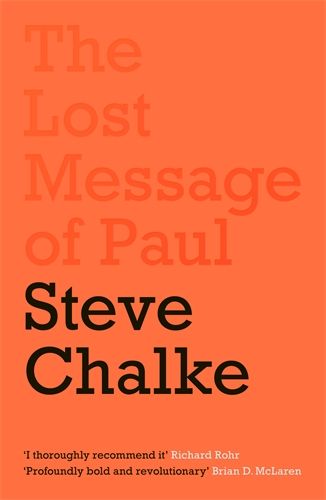The Lost Message of Paul by Steve Chalke
An exploration of a reading that we are saved not by our faith in Christ, but the faith of Christ
 The Lost Message of Paul
The Lost Message of Paul
By Steve Chalke
SPCK
ISBN: 978-0-281-07940-7
Reviewed by Martin Poole
When you pick up a book written by Steve Chalke you can be sure that it will be well crafted, direct and, depending on your point of view, heretical. It will also be, as Steve pleads in his introduction, an opportunity to discuss key parts of the Christian faith.
Steve Chalke’s latest book is really the story of two raindrops landing either side of the watershed only millimetres apart, but ultimately flowing out to the Pacific or Atlantic – oceans apart. A crucial part of Steve’s exposition, which is not without scholarly support, is to alter the preposition “in” to “of”.(Phil 3:9) The conclusion is that we are saved not by our faith in Christ but the faith of Christ – Christ’s own faithfulness exemplified by his “allegiance to his divine mission”. This flows out into a mantra from Paul’s beautiful Corinthian poem – “Love never fails”
But if Love never fails then how can some people be outside God’s love and be damned? As a result Steve argues that the right response is to be a Christian Universalist. This he understands is not the same as saying all faiths are different paths to the same hope, but that God through Jesus will reconcile to himself all things” Col 2:20. This is perhaps why Steve maintains Jesus and Paul never talked about eternal punishment, but, as Steve would argue, a positive pruning. As one can imagine, Jesus' words about Hell are critically examined alongside his assertion that the refiner’s fire is to cleanse not to destroy.
He states that when it comes to the day of judgement this is almost always seen in scripture as a positive thing, something to be looked forward to – a great righting of wrongs – but often it is feared because of a wrong perception of phrases like “the wrath of God”. The wrath of God needs to be read as the anguish of God, who like an earthly father sees his children harming themselves by their actions and who wants them restored to what they should be – salvation!
One very powerful illustration in the book is an occasion where Steve defended the ten commandments before a radio presenter who saw them as the sign of a gloomy, miserable, killjoy God, instead of one who desires to save mankind from destructive and harmful practices “which will unleash destructive powers that you will come to regret, which will slowly overshadow you....”
In his book Steve continually splits the world church into its East and Western counterparts, maintaining that much of what he puts forward is already accepted in the Eastern or Orthodox church but denied in the West, which is dominated by an overriding concern with personal salvation. The gospel is much bigger. He questions whether we place too much emphasis on the cross and fail to celebrate the resurrection with all its implications for the here and now as well as the future. In fact he despairs that when the phrase “kingdom of Heaven” occurs, arguing that it has been narrowed by many to a place located elsewhere, up there, rather than the age in which we live and where Christians can actively bring Jesus kingdom values into today’s distorted and unjust world view.
I imagine many will give Steve’s book the same treatment that Luther gave to James – “an epistle of straw” – but I believe that wrestling with fundamental issues is always helpful in furthering and deepening our understanding of the gospel. To join Steve in his discussion can be useful, even if you swim in a different ocean.
The Revd Martin Poole is a retired Baptist minister having served churches at Penarth, Godalming and Eastleigh
Related: The Lost Message of Paul by Steve Chalke reviewed by regular Baptist Times contributor Chris Goswami on his his blog 7 minutes
Baptist Times, 05/12/2019